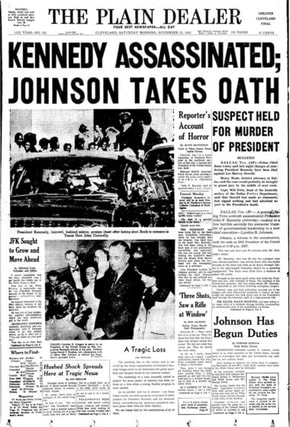|
This question was posed to me in 2010 by Randy Benson, who was then working on his film THE SEARCHERS, which released this year. I thought it was a good question and answer, and I thought it might make sense to include it here in my blog. RANDY BENSON: Wondering if I could get your opinion on a JFK research question: One thing I'm trying to do is to address questions the intelligensia has been posing to me, i.e. people I work with at Duke, etc. A question I feel I need to answer is, "What do they (researchers) want? Most of Americans believe that it was a conspiracy, so what do you want?" It's a fair question. Most are dead already, so they can't be held accountable (save perhaps Billy Sol Estes, Hosty, et al.) But do we want the Times or the Post or the rest of the MSM to validate us? If all of the files are finally released, can they create an accurate narrative to inspire people to force accountability in the national security state, etc? This is something that I really feel I need to address in my movie. Any opinions?  JOE GREEN: Sure thing. This is something I've tried to address in my work maybe more than some other researchers, and specifically to the academic crowd. Len [Osanic] and I have talked about it loosely in my last couple of BOR [Black Op Radio] appearances, and I closed my newest CTKA [now Kennedysandking.com] article with comments in this direction. I think, in some ways, that this is the key question of the whole thing. First, I agree that if you study the JFK assassination solely in terms of its internal structure, then it is a hobby and essentially interchangeable with being a Trekkie. There are a few people who are like that, attending parties set in a mock-up of Jack Ruby's bar just for fun. Not many, however. Most people became interested in the assassination because they identified with Kennedy, and by extension his policies, and against the Vietnam War, among other things. In my view, the assassination is a kind of Rosetta Stone to understanding how power operates in the United States. Prior to 1963, American exceptionalism was very much the rule; Frances Fitzgerald showed this in her study of American high school textbooks. After 1963, the thesis is still operative (in such writers as Stephen Ambrose and David Halberstam) but there is an undercurrent of popular dissent and a realization -- at least by some -- that American actions are not always endorsed by God, so to speak. The counterculture movements were birthed from it; after all, I think Jim Douglass has shown that Kennedy was murdered in large part because of his opposition to the Vietnam War in particular and War in general (also cf. the excellent film Virtual JFK) and of course these movements were spawned to oppose war. The trick is not to get mired in the assassination itself, but to go outward, to make judgments about what happened in this singular instance -- Nov. 22, 1963 -- and use that information to judge other events in this light. What one finds, I think, is that the real driving force of the assassination, and most of the terrible events in our lives, is monopoly capitalism. Monopoly capitalism is an economic machine which burns finite resources at a rate that would only make sense were they infinite, and therefore demands the acquisition of greater and greater resources until the whole thing collapses upon itself. In the last analysis, I tend to view the Industrial Revolution as an evolutionary dead-end, in effect; it will one day be replaced, because it is totally unworkable. Our own civilization, we must remember, is an eyeblink compared to some others, and our assumed superiority is entirely in our own perception. One thinks of the Aesop fable in which a lion says that if lions could sculpt, they would sculpt a lion eating a man. The question is whether we can avert the system before it collapses totally (resulting in chaos and mass death among the civilian population, especially, as always, the poorest among us) or whether we can get enough of a popular will to restrain the machine enough to prevent it from destroying us. To this end, in order to wake up the populace, we need to exploit the holes in American exceptionalist theory (which survives in Milton Friedman and other paid cheerleaders) such as the Kennedy assassination. JFK's murder reveals the US for the what it is: the most powerful banana republic in the world, or as Parenti says, a gangster state. So no, I am not looking to pin the assassination tail on a particular donkey. I hope that makes some sense, at least -- kinda tossed this off the top of my head. You've made me realize that I should try to write a full essay on this topic, however...
0 Comments
Your comment will be posted after it is approved.
Leave a Reply. |
AuthorThis is Joe Green's blog. Archives
August 2021
Categories |
 RSS Feed
RSS Feed
